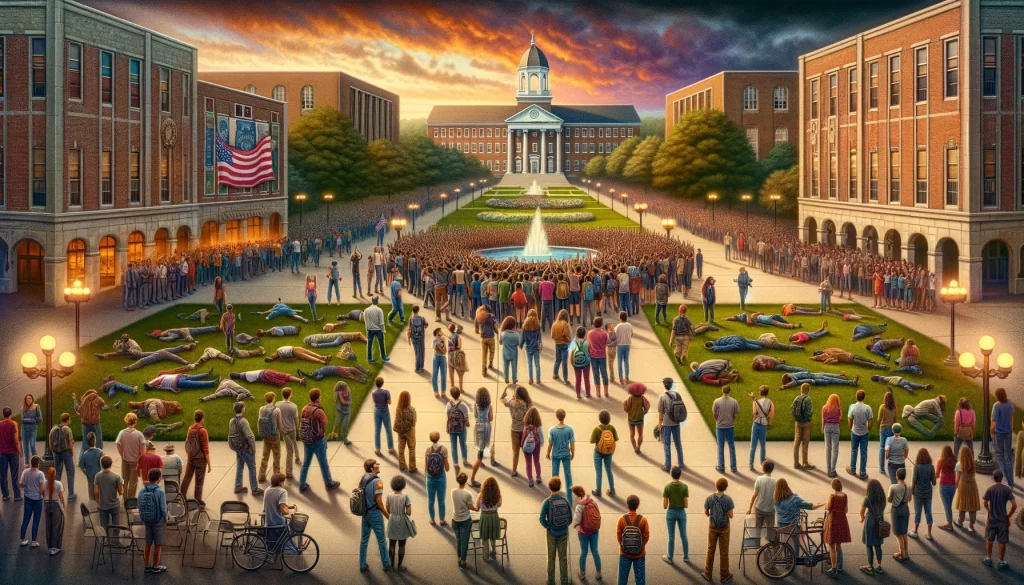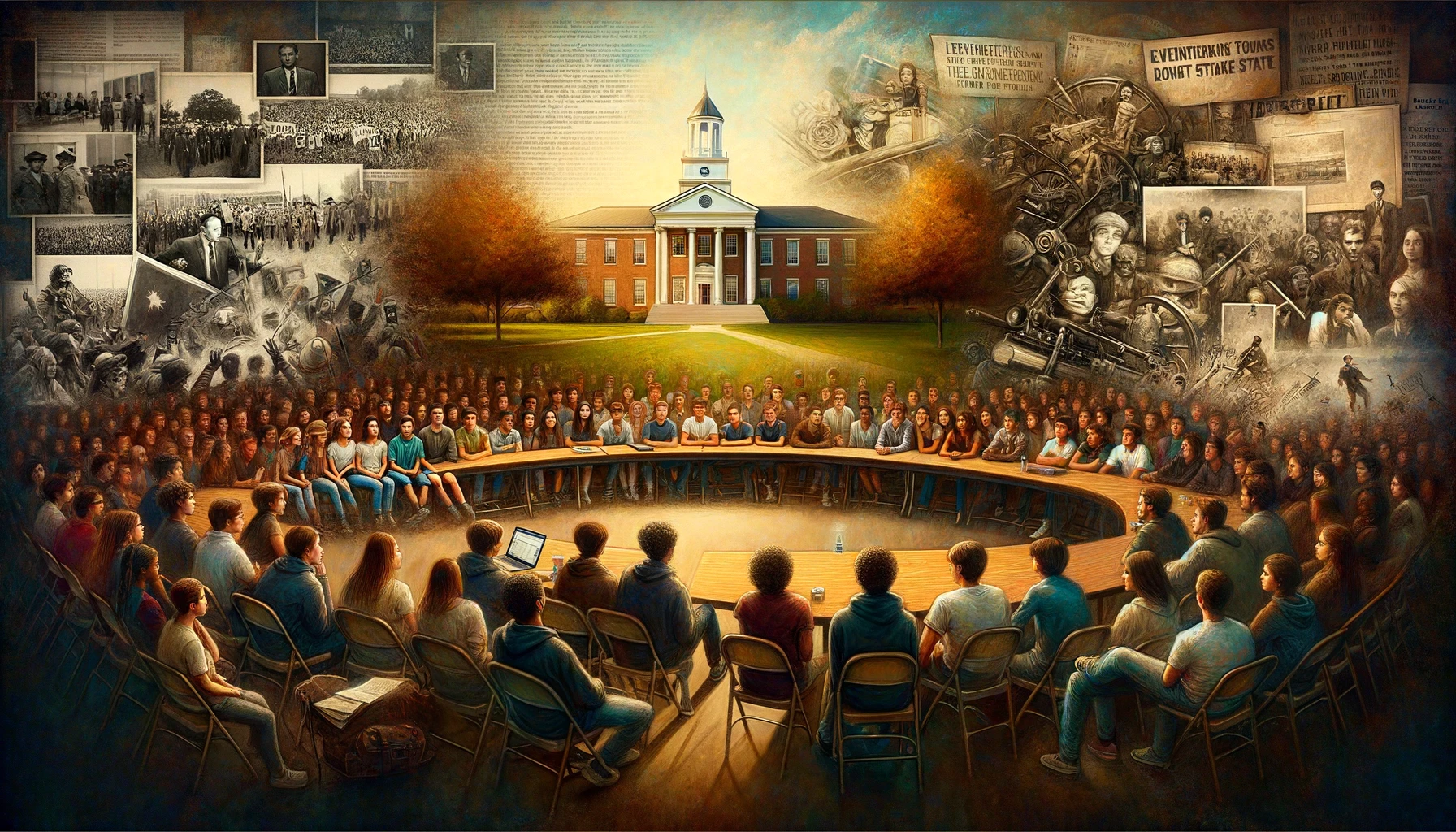When Roseann “Chic” Canfora first arrived at Ohio’s Kent State University in 1968, she often found herself being handed anti-war flyers, which she initially discarded without much thought. The Vietnam War was ongoing and increasingly unpopular, affecting more and more Americans each day. Over time, as the conflict touched her personally through the loss of friends and the threat of the draft reaching her brothers, Canfora’s perspective shifted dramatically.
She started to engage with the anti-war movement more deeply. “It wasn’t until I was personally touched, losing friends in that war and seeing the draft that would now take my brothers to that war, that I stopped throwing the anti-war leaflets away and I paid attention,” she shared with NPR.
Canfora sees echoes of her own experiences in the actions of today’s college students, who protest for causes like a cease-fire in Gaza and push for their universities to divest from companies connected to Israel. “They at least know that they don’t want any famine and suffering and death done in their name,” she notes. “And so it’s inspiring to see them having similar conversations that we had, saying ‘We don’t like what we’re seeing and we need to speak out against it.'”
The response to current protests has been significant, with many college administrations involving local and state police to manage the demonstrations. This has led to over 2,000 arrests nationwide in just two weeks, with injuries occurring among the protesters. The situation escalated when House Speaker Mike Johnson urged President Biden to deploy the National Guard to manage a large protest at Columbia University, which had already seen police action leading to around 300 arrests.
Canfora is deeply familiar with the severe outcomes that can result when the National Guard intervenes in campus protests. As a sophomore, she was part of a rally on May 4, 1970, a day that ended tragically when the Ohio National Guard opened fire on students. Four were killed, and nine were injured, including her brother, Alan.

Describing the harrowing experience, she recalls, “My brother’s roommate pulled me behind a parked car, and it was at that moment that I realized this was live ammunition because the car was riddled with bullets. The glass of the car windows was shattering above us, and we could hear the M1 bullets zipping past our heads and bumping into the ground in the pavement around us. And it was a horrifying 13 seconds.”
After the gunfire ceased, Canfora found her brother and saw several classmates injured, some fatally. She was one of 25 people indicted in connection with the demonstration, though most, including herself, were later exonerated. “Those trials were eventually thrown out for lack of evidence that we had participated in a riot,” she explains. “Even though we were grateful that those indictments were thrown out … we had lost our opportunity to tell the world what happened that day.”
Canfora has spent decades working to preserve the legacy of that day and now serves as a professional-in-residence at Kent State, teaching journalism and planning commemorative events. She emphasizes the importance of remembering these events to ensure that current and future students can express their views safely. “It’s hard to believe that this will be our 54th year of returning to the Kent State campus to talk about what we witnessed and survived here, and to tell the truth that we know so that … people learn the right lessons from what happened here so that students on college campuses can exercise their freedom of speech without the fear of being silenced or harmed,” she says.
Canfora highlights the critical reports that emerged following the tragic events at Kent State University. Notably, a commission formed by President Nixon in June 1970 described the shootings as “unnecessary, unwarranted, and inexcusable.” Additionally, an FBI report later that year suggested that the Ohio National Guard’s claims of acting in self-defense were likely fabricated after the incident.
Following a lengthy legal battle that spanned nearly a decade, the guardsmen involved settled out of court with the victims, though the state compensated the families of those injured. The Ohio National Guard issued a statement admitting, “In retrospect, the tragedy of May 4, 1970 should not have occurred.”
Canfora also points out the prevalent misinformation following the event, as rumors and justifications for the guards’ actions spread. She recalls, “Students had two hours to leave campus, and I remember watching the theories take off on television from my family’s house.” “I had an aunt that came into our home while my brother was still bandaged from his wound saying, ‘You know, there was a sniper [threatening the Guardsmen],'” she recounts. “It was very difficult for middle America to believe that American soldiers would turn their guns on American people without some provocation.”

The impact of the shootings continues to resonate in campus activism at Kent State. Despite initial resistance, when the university stated in 1975 that “five years was long enough to remember,” students and survivors established the May 4th Task Force to ensure ongoing recognition and commemoration of the event. The annual events now include a candlelit walk, a memorial service, and special lectures, underlining the community’s commitment to remembering the past and educating future generations.
The university has since embraced its history, incorporating the lessons learned into its core values and educational programs. Kent State University President Todd Diacon emphasizes that values like kindness, respect, free speech, and civic dialogue are fundamental to the institution’s identity. He notes that the university promotes these principles actively, particularly through its School for Peace and Conflict Studies, founded shortly after the tragedy.
Diacon also recognizes the unique challenges faced by public universities compared to private ones, especially in terms of free speech. He stresses that while policies may vary, the lessons from the Kent State shootings are universally relevant, particularly the risks associated with armed responses to campus protests.
Reflecting on today’s college students, Canfora admires their commitment to activism despite the constraints of modern academic and economic pressures. Unlike her time at college, when tuition and living costs were significantly lower, today’s students often balance full course loads with extensive work hours to afford their education.
Canfora passionately argues that college campuses should remain vibrant centers of free thought and activism, declaring, “College students are the conscience of America.” She believes campuses should be places where students can freely engage with and challenge societal issues, a role she sees as essential to the health and progress of democracy.
This article is based on the following article:
https://www.npr.org/2024/05/04/1249023924/kent-state-shooting-activists-protests-survivor

Background Information
Understanding these aspects provides a comprehensive background that can help readers better comprehend the significance of the events discussed in the article and their impact on American society and politics.
The Vietnam War
The Vietnam War was a prolonged conflict (1955-1975) between Communist forces in North Vietnam, supported by the Soviet Union and China, and South Vietnam, backed by the United States. It was part of the broader geopolitical struggle known as the Cold War. The war was controversial, especially in the United States, because of its perceived lack of clear objectives and significant human costs. Public opinion shifted significantly over the years, leading to widespread protests across the country, especially on college campuses.
Draft and Conscription
During the Vietnam War, the United States enforced a military draft, compelling many young American men to serve in the war. The draft was highly controversial and was seen as a driving force behind the anti-war movement, as it personally affected millions of American families and brought the war to the forefront of American consciousness.
Kent State Shootings (May 4, 1970)
The Kent State shootings occurred when the Ohio National Guard opened fire during a mass protest against the bombing of Cambodia by United States military forces. Four students were killed and nine were injured, sparking a nationwide outcry and a significant shift in public opinion regarding the U.S. involvement in Vietnam. The event highlighted the extreme tensions between government authorities and those who opposed the war.
National and Campus Response
The shooting prompted a significant backlash against the Nixon administration and led to further nationwide protests. Many universities faced the challenge of balancing security and respecting the free speech rights of students. The shootings became a symbol of the potential for tragic outcomes when governmental power is used to handle civil unrest.
Legal and Political Repercussions
Following the shootings, there were numerous legal battles. Public inquiries like the Scranton Commission formed by President Nixon condemned the actions of the Ohio National Guard. These events also influenced public policy and attitudes towards protest and civil disobedience in the United States.
The Role of Media
Media coverage of the Vietnam War and the social movements of the 1960s and 70s played a critical role in shaping public opinion. The portrayal of the Kent State shootings, for instance, helped to galvanize the anti-war movement and brought greater attention to the issues of civil rights and government accountability.
Legacy and Memory
The legacy of the Kent State shootings extends into how events are memorialized and how history is taught. The creation of the May 4th Task Force and the annual commemorative events at Kent State University serve as a reminder of the need to remember and learn from past injustices. These efforts help ensure that future generations understand the importance of civic engagement and the rights to protest and free speech.

Debate/Essay Questions
- Was the response by the National Guard at Kent State University justified under the circumstances presented at the time?
- To what extent should colleges and universities be involved in political issues, such as divesting from companies for ethical reasons?
- Is violent protest ever justified in a democratic society?
- Why is it important to have physical memorials and annual commemorations of events like the Kent State shootings?
Please subscribe to Insight Fortnight, our biweekly newsletter!
